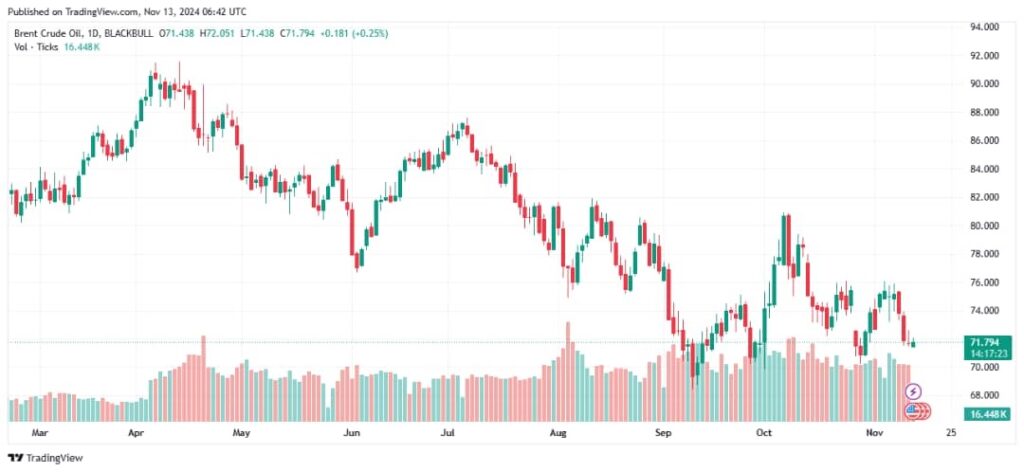
Akintunde Oyedokun
Research Analyst
Oil prices stayed near two-week lows Tuesday after a 5% drop in recent sessions, pressured by OPEC’s lower demand forecast and weak Chinese stimulus. Brent settled at $71.89 per barrel and U.S. WTI at $68.12, both rising just 0.1%.
OPEC revised its 2024 demand growth down to 1.82 million barrels per day (bpd), its fourth consecutive downgrade, as China’s lackluster demand and economic outlook add to OPEC+ challenges amid price pressures.
India’s Retail Inflation Hits 14-Month High, Delaying Interest Rate Cut
India’s retail inflation surged to 6.21% in October, its highest in 14 months, driven by soaring vegetable prices. This figure exceeded the Reserve Bank of India’s tolerance band and dashed hopes for an interest rate cut in December. Food inflation spiked to 10.87%, with vegetable prices up 42.18% year-over-year, impacting middle-income households and corporate growth. Despite signals of an easing monetary policy, experts now expect the RBI to consider a rate cut only by February.
Germany’s Inflation Confirms Preliminary Data, Records 2.4% In October
According to the Federal Statistics Office, German inflation saw a noticeable increase, reaching 2.4% in October. This latest figure aligns with preliminary data, reflecting a significant rise in consumer prices across Germany. For comparison, German consumer prices, harmonized to facilitate comparison across the European Union, had increased by 1.8% year-on-year in September. The uptick in October suggests ongoing inflationary pressures within the German economy.
South Africa’s Unemployment Rate Falls As Coalition Government Boosts Confidence
South Africa’s unemployment rate fell to 32.1% in Q3 2024 from 33.5% in Q2, marking its first decrease in a year, as reported by Statistics South Africa. The coalition government formed in June, bringing together the African National Congress and the Democratic Alliance, has improved business confidence and strengthened the rand. Employment gains were seen in sectors like construction, trade, and agriculture, though joblessness remains high, especially among Black South Africans.
Nigeria’s Crude Oil Production Rises To 1.43mbpd In Oct., Still Below OPEC Quota
Nigeria’s crude oil output rose to 1.43 million barrels per day (bpd) in October 2024, marking a 35,000 bpd increase, according to OPEC’s monthly report. Despite this growth, Nigeria remains below its OPEC quota of 1.5 million bpd. Secondary sources confirm Nigeria leads African oil production, with Libya and Algeria following. The oil sector, though a small GDP contributor, is crucial for Nigeria’s foreign exchange and revenue, affecting economic stability amid production fluctuations.













